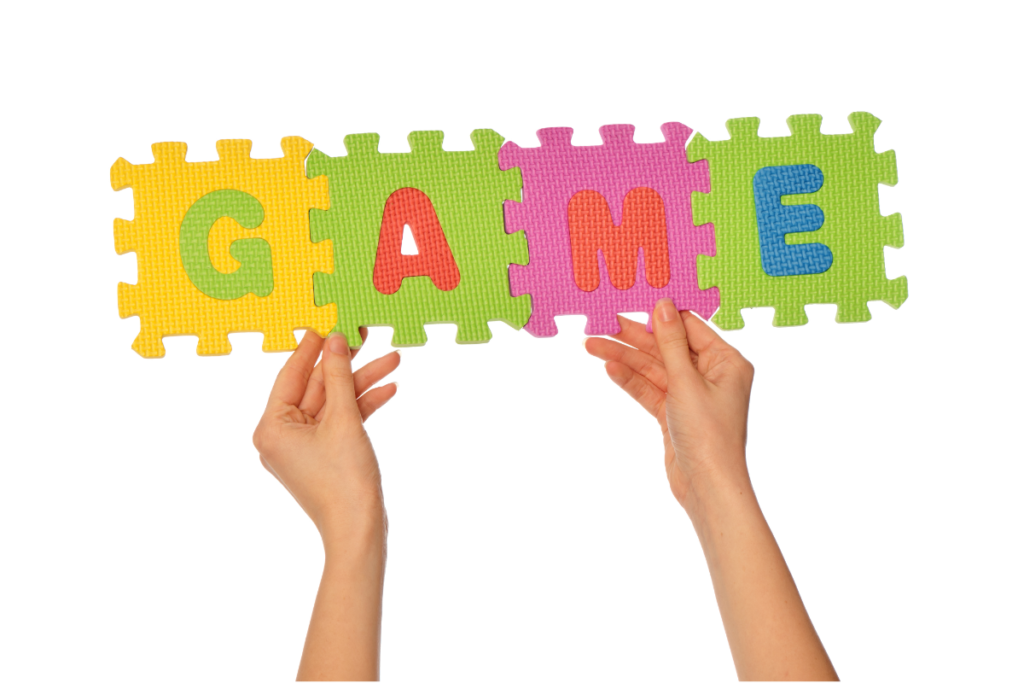
Word awareness is the understanding that a phrase or sentence is made up of individual words. It’s also the ability to manipulate words in phrases and sentences which includes playing with compound words. Word awareness is the most basic level of phonological awareness and seems incredibly simple to us adults. We can easily hear three separate and distinct words in the sentence, “The dog walks.”
It may take us a moment to count, but we can also hear fourteen separate and distinct words in the following sentence, “Can you please stop at the store for more milk on your way home?” But, this is not as easy for our little ones, especially our youngest students.
Here are a few multisensory games you can try to play with your children to develop their word awareness skills.
Sentence Segmentation
These games help your child to understand that sentences are made up of words. They involve you saying an oral sentence to your child – the sillier, the better! You’ll also want your child to repeat each sentence back to you to work on their memory skills and count the number of words they hear (if they’re ready for this).
Move It
Say a silly sentence, such as, “The cat eats cookies” and have your little one do an action for each word they hear (such as squats, lunges, jumping jacks, or elbow-to-knees).
Smash It
Have your child roll out multiple play dough balls. You say a silly sentence, such as, “The duck plays soccer“ and your child lines up the play dough balls in a row for each word they hear (from left to right). Then they repeat the sentence, smashing one play dough ball for each word.
Build It
Say a silly sentence, such as, “The donut makes spaghetti” and have your child build a tower out of blocks, one block for each word they hear. They can also use legos or unifix cubes to build.
Hopscotch It
Draw a hopscotch board outside with sidewalk chalk. You say a silly sentence, such as “Billy Bat went ice skating” and have your child jump on the hopscotch board while repeating the sentence, one jump for each word they hear.
Tap It
Have your child hold out their left arm straight in front of them. Say a silly sentence, such as, “The kangaroo reads” and have them tap down their arm with their right hand. They tap at their shoulder for “The,” at their elbow for “Kangaroo,” and at their wrist for, “Reads.”
Head Shoulders Knees & Toes
Say a silly sentence, such as, “The dragon breathes ice” and have your child touch their head, shoulders, knees, and toes for each word.
Human Sentence
If you have a small group of kids, you can have them BE the sentence! Say a silly sentence and have one child line up for each word they hear. Then have the group repeat the sentence together.
Word Manipulation
The goal for these activities is to mix up words within sentences or replace one word with another and then have your child listen for the changes.
Nursery Rhyme Mix Up
Tell your child you’re going to sing a favorite nursery rhyme, but you’re going to change one of the words. Their job is to tell you which word you changed. For example, if you sing, “Humpty Dumpty” you could change it to, “All the queen’s horses and all the queen’s men.” Then they would tell you that you changed “king” to “queen.”
Song Swap
Change your child’s favorite songs to include different words. This is fun to do based on what your child’s interests are. For example, if your child loves, “The Wheels on the Bus” and you’re doing a farm activity, you can change it to something silly like, “The cow on the bus says mooo moooo moooo.”
Or if your child loves, “If You’re Happy and You Know It” and you’re doing an emotion activity, you can change it to “If you’re mad and you know it, stomp your feet.”
Compound Words
Tell your child two words, such as “butter” and “fly” and ask them what word they can make if they say the two words together (“butterfly”). You can also tell them one word like “foot” and ask them if they can think of another word they can add to “foot” to make a compound word (like “football”).